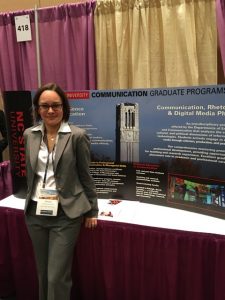By Annie Grant
In November, a faculty member from the Department of Communication was selected as a University Faculty Scholar. Dr. Adriana de Souza e Silva, associate professor and director of the CRDM program, is the first person in the department to receive this award and only the sixth from Humanities and Social Sciences since the award’s inception in 2012.
Approximately 20 faculty members are recognized as faculty scholars each year. With 2,323 faculty members at NC State, it is quite an achievement. These scholars are tenured or tenured-track faculty and nominated by their college. Nominees are reviewed and then recommended by the provost’s administrative advisory committee. After discussion with the chancellor, the provost makes the final selection of scholars based on “Significant achievement appropriate to rank in research/scholarship, teaching, and/or extension/engagement/service.”

Professor Adriana de Souza e Silva
“What made Dr. Adriana de Souza e Silva such a great nominee — and eventual University Faculty Scholar — is her very important and creative research on how people use mobile technologies to interact with people in public spaces and in society overall. This work is really at the cutting edge of thinking about how these technologies — which have rapidly spread around the world — are affecting the way we live,” said Dr. Thomas Birkland, associate dean for research and engagement in the College of Humanities and Social Sciences. Dr. Birkland manages assembling the nominations for the faculty awards in Humanities and Social Sciences.
Dr. de Souza e Silva was born in Brazil and moved to the U.S. in 2001 as a visiting scholar at the University of California, Los Angeles. She has been at NC State since 2005 and teaches courses at all levels in the Department of Communication, primarily about the Internet and society and mobile communication.
In her research, Dr. de Souza e Silva looks at mobile communication interfaces and location-based services. She studies the impact these technologies have on how people move around cities and interact with others. She also conducts part of her research in her home country. Specifically, she studies how low-income people in Brazil appropriate technology creatively. The goal is to understand the way socioeconomic differences affect the creative use of technology.
“I’ve always been a very curious person,” said Dr. de Souza e Silva with a laugh. “Being a university professor allows me to do the research I like and to interact with students. I don’t think I have anything I would complain about.”
Fellow researchers have cited Dr. de Souza e Silva more than 700 times, according to Google Scholar. She says she is proud of her publications and awards, but her 3-year-old son is her greatest accomplishment.
Along with the five-year title of being a University Faculty Scholar, Dr. de Souza e Silva, and the others awarded, receive a $10,000 annual supplement for salary or program support.

